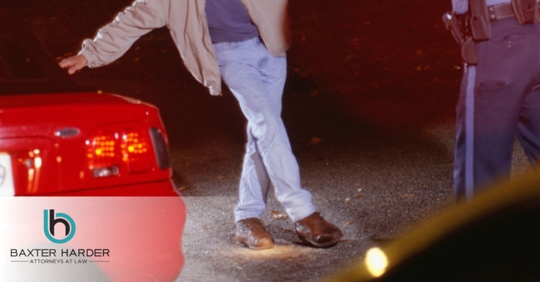For the police to arrest someone for DUII, they must first obtain valid evidence of the driver’s intoxication. Typically, this is done through one or multiple evaluations. Let’s go over the tests that police officers may use to assess a driver’s sobriety and how to challenge the results in court.
Types of DUII Evaluations
Breath Tests
This is likely the first example that comes to mind for many individuals. Breath tests are conducted using breathalyzer devices that provide an estimated value for the driver’s blood alcohol concentration. In Oregon, the legal limit is 0.08% BAC. The test is administered by having the driver blow into the device's mouthpiece for a few seconds. Then, the device will provide an estimated blood alcohol concentration reading based on the amount of alcohol detected in the sample.
It’s important to mention that breath tests are required under implied consent laws. Implied consent laws require drivers to take chemical tests when asked. Refusal to take a breath test can result in the driver’s license being suspended. However, drivers will also face a license suspension if they have a BAC over 0.08% or are found to have controlled substances in their system.
Blood Tests
Blood tests may also be used to collect evidence of alcohol impairment. There are two types of circumstances under which a blood test may be ordered. First, if the driver refuses to take a breath test. If the officer has probable cause that the driver is under the influence, but they do not consent to a breath test, the officer may get a warrant for a blood draw. Second, if the driver suspected of DUII was injured, is being treated at a hospital, and is unable to come to the police station to take a breath test. In this situation, the hospital may draw the driver’s blood for further testing.
Urine Tests
Another method for collecting evidence of DUII is through urine testing. Urine tests are used to identify drugs in the driver’s system. This could include marijuana, hallucinogens, or other illicit substances. Urine tests are not used for detecting alcohol.
Urine tests are only administered either at the jail or at a hospital. Like with blood tests, the officer may get a warrant to obtain a urine sample.
Field Sobriety Tests
Field sobriety tests don’t require the driver to provide any chemical evidence of DUII. Instead, field sobriety tests are physical examinations used to in cases when the driver is suspected of being under the influence of drugs and/or alcohol.
The main types of field sobriety tests are:
- The Walk and Turn Test
- The One Leg Stand Test
- The Horizontal Gaze Nystagmus Test
These tests require drivers to exhibit their coordination and balance. If the driver does not perform up to the officer’s standard, they will fail the tests. They may then use field sobriety test evidence to justify a DUII arrest.
As mentioned previously, breath, blood, and urine tests are required under implied consent laws. However, field sobriety tests are not. These are not legally mandatory tests and drivers will not face a penalty if they refuse to take field sobriety tests. The only potential repercussion for refusing to take field sobriety tests is that your refusal may be brought up later in court. However, this is still a better option than taking the tests and providing the police with more evidence to use against you.
The Faults of DUII Tests
Some of the tests mentioned above are considered to be more reliable than others. However, each type of DUII evaluation has flaws that affect the reliability of the results and evidence. There are numerous ways you can challenge DUII evaluation evidence.
Breath tests. Several factors can affect the accuracy of the BAC reading. Some potential errors have to do with the device itself. If the machine is not properly maintained or calibrated, it can provide an inaccurate reading. Additionally, if the officer conducts the test improperly or misreads the results, this can be the reason for an incorrect BAC reading. All law enforcement officers administering breath tests must go through required training. Additionally, breath test results can be skewed by the driver’s medical conditions, recent burping or vomiting, or the presence of mouth alcohol.
Blood and urine tests. Blood tests are considered the most accurate type of DUII chemical test. However, the results can be unreliable if the samples were not properly extracted, stored, or tested. The same issues can also affect the accuracy of urine tests.
Field sobriety tests. There is a lot of controversy about field sobriety tests. Many professionals believe that these tests do not provide strong enough evidence to warrant an arrest or prove that the driver was under the influence. These tests are subjective, as the driver may fail if they do not perform up to the officer’s standards. In reality, a driver’s performance of FSTs may be affected by the weather, their footwear, their medical conditions, their understanding of instructions, or numerous other factors.
Bend, Oregon DUII Attorneys
An experienced criminal defense attorney will be able to look at the evidence collected during your DUII stop to identify any potential errors or inaccuracies. Our team at Baxter Law, LLC has helped numerous clients get evidence thrown out, resulting in their entire case being dismissed. Share the details of your arrest with our DUII defense attorneys today by calling (541) 238-9210. Once we learn more about the specifics of your case, we can get started on helping you build the best possible defense.

